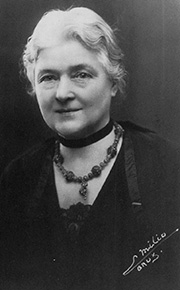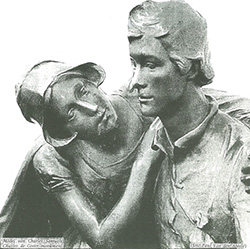Neel Doff
Girl from the gutter becomes transnational femme de lettres
Neel Doff climbed from a very poverty-stricken childhood in the Netherlands to an existence as a successful writer in French-speaking Belgium and France. In addition, she translated some important authors: Multatuli, Felix Timmermans, Carry van Bruggen and Louis Couperus.

Cornelia Hubertina Doff (1858-1942), was born in the Netherlands into a large and poor family. Her father was an alcoholic and often unemployed. From an early age, Neel had to contribute to the family income. In 1873 she was persuaded by her mother to prostitute herself.
In 1874, the Doff family moved to Belgium. A year later, Neel left for Brussels, where she earned her money as an artist's model and in prostitution. In one of the painting studios, Neel Doff became acquainted with the publisher Fernand Brouez, and the two started an affair in 1885.
The socially-minded Brouez enabled her to make up for her educational deficits. In December 1896, they married. Following Brouez' death in 1900, Doff remarried a close friend, the lawyer Serigiers. The couple settled in Antwerp.
Writings
In 1909, Neel Doff, over fifty years old, began to write. She would publish exclusively in French. Serigiers corrected her language in the margins of her manuscripts. After a first publication as a serial, Jours de famine et de détresse, an account of her childhood, appeared in book form in 1911 and met with immediate success. Doff narrowly missed out on the prix Goncourt. Her next books were also based on her own life and experiences. She had her greatest successes with Keetje (1919) and Keetje Trottin (1921). In 1930 she was made an officer in the Order of the Crown in Belgium and there were even a few calls to nominate her for the Nobel Prize.
Translations of her works exist in Spanish, English, Russian, and German, and Paul Verhoeven made the successful film adaptation Keetje Tippel in 1975.
Translator

Monument for Charles De Coster by Charles Samuel representing Tyl Uylenspiegel and a young Neel Doff as his friend Nele
In March 1887, following Multatuli's death, stimulated by Brouez and her newly acquired knowledge, Neel Doff published three French translations of short pieces from his work (Impresario, Chresos, and Kruissprook) under the collective title Trois contes.
She had come to know Multatuli's work, in particular Woutertje Pieterse, as a maid when she was fourteen and it would remain important to her throughout her life, including as an inspiration for her own literary work, as Josette Gousseau stresses in her article "Devenir un personnage de roman: Keetje dans la trilogie de Neel Doff".
The translations appeared in La Société Nouvelle, a periodical founded and edited by Brouez. They were signed "Mlle C.D." (for "Cornelia Doff"). The following year, the same journal also published a translation of the first four chapters of Max Havelaar, which is usually attributed to Doff (e.g. Kolenberg 1971), but which was published without a translator's name.
It would be a long time before Neel Doff manifested herself as a translator again: the next title she published was L'Enfant Jésus en Flandre (Het kindeke Jezus in Vlaanderen) by Flemish writer Felix Timmermans (Rieder, 1925). The book was well-received, with the quality of the translation also being explicitly mentioned on a few occasions. On 26 April 1925, for example, the drama newspaper Comoedia, which had published Doff's first book in serial form a few years earlier, wrote: "La traduction de Mme Neel Doff, colorée et précise, a tout l'attrait d'une œuvre originale, et ce n'est pas le moindre intérêt de ce livre." ("Mrs. Neel Doff's translation, colorful and precise, has all the appeal of an original work, and this is not the least interest of this book.")
Another review, in the Revue germanique of January 1st, 1925, goes a little deeper into the qualities of the translation, leaving us to wonder whether they would still be so positively appreciated today, or would simply be considered to express poor command of the target language:
"Nous ne pouvons juger du style de F. Timmermans dans sa langue maternelle ; mais le traducteur en a garé un grand nombre d'expressions qui, quoique correctes en français, rappellent discrètement leur origine flamande, par exemple : Laissez-moi dormir encore une fois là-dessus (pour : la nuit porte conseil) ; la stupide bonne bête (en parlant de l'âne) ; colline en bas, colline en haut (c'est-à-dire par monts et par vaux). Ces locutions, et tant d'autres encore, ont l'appréciable avantage de conserver au style, la couleur et le goût de terroir, qui risquent toujours de se perdre dans la traduction. " ("We cannot judge the style of F. Timmermans in his mother tongue; but the translator has kept a great number of expressions which, although correct in French, discreetly recall their Flemish origin, [...]. These expressions, and so many others, have the appreciable advantage of preserving the color and taste of the land, which are always in danger of being lost in translation.") The fact remains that the book was quite successful and had several editions.
A few years later, another translation by Doff appeared with the publisher who had also published her own Keetje trottin a year earlier: La maisonnette près du Fossé (Editions du Tambourin, "Lire de l'inédit" series n°1, 15 août 1931), translation of Het huisje aan de sloot by Carry van Bruggen, . Two years before, in a major interview (Les nouvelles littéraires, artistiques et scientifiques, Dec. 21, 1929), she told the interviewer about translating this "picturesque and moving" book, and how she translated when she had no inspiration to write. The novel bears similarities to Doff's own work, as Van Bruggen too describes the world through the eyes of a growing girl form a poor family. This thematic affinity plus the fame Doff enjoyed around 1930 with her Keetje trilogy undoubtedly weighed in the editorial decision to mention "Neel Doff & Carry van Bruggen" as author names for La maisonnette près du Fossé. However, the translation does not seem to have had much success: to my knowledge, it was not discussed in the press. The somewhat unusual and not very prestigious format in which it was issued may have played a role: the title appeared bundled in one volume with four other rather disparate titles (two novellas, a play and a detective): good reading on a long travel by train, as one book column succinctly put it. It was the first, and presumably the last, volume of a monthly series. A short time later, the publishing house ceased to exist.
A few years before her death Neel Doff would try to publish one last translation: her biographer Evelyne Wilwerth reports that in 1938 she entrusted her translation of Couperus' Van Oude Menschen, de dingen die voorbijgaan to editor Henri Poulaille. The book would never actually appear. Wilwerth indicates that interest in Doff had cooled in France. In addition to that, Henri Poulaille was probably not the right person to promote this particular title. Poulaille, who for years was a tireless advocate of what he called proletarian literature - works written by and for the working class - held Neel Doff's oeuvre in high esteem and brought it to attention both before and after her death. Louis Couperus and the wealthy circles that form the backdrop in Van oude menschen... belonged to a very different world.
References
Neel Doff 1858-1942, exhibition catalogue, Bibliothèque royale, Bruxelles 1992.
Stefan Brijs, Villa Keetje Tippel, Atlas, Amsterdam/Antwerpen, 2001.
Eric Defoort, Neel Doff, leven na Keetje Tippel, Hadewijch, Antwerpen/Baarn, 1993.
Josette Gousseau, « Devenir un personnage de roman : Keetje dans la trilogie de Neel Doff », Nouvelles études francophones, vol. 19, no 2, 2004, p. 15-30.
Frédéric Lefèvre, “Une heure avec Neel Doff”, Les nouvelles littéraires, artistiques et scientifiques, 21 dec. 1929, p.1-2, https://gallica.bnf.fr/ark:/12148/bpt6k64505572/f1.item.r=neel%20doff%20traduction
Marianne Pierson-Pierard, Neel Doff par elle-même, Esseo, Bruxelles, 1964.
Vera Weterings, “Doff, Cornelia Hubertina (1858-1942)”, Digitaal Vrouwenlexicon van Nederland, http://resources.huygens.knaw.nl/vrouwenlexicon/lemmata/data/Neel%20Doff
Évelyne Wilwerth, Neel Doff, biographie, Le pré aux Sources, Bruxelles, 1992.
